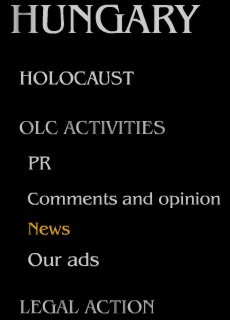BUDAPEST (EJP) --- Hungarian Jewish groups staged a demonstration in front of the parliament in Budapest to protest at anti-Semitic calls by an extreme-right politician last week to create a register of Hungarian Jews in the interests of “national security”.
Efraim Zuroff of the Simon Wiesenthal Centre’s Israel branch described the rally which attracted tens of thousands of participants Sunday as “the most important demonstration since Hungary became a democracy”, as well “the biggest blow to the Jobbik party since its inception”.
Martin Gyongyosi of Jobbik was forced to apologise to his “Jewish compatriots”, after telling parliament last Monday that it was time “to assess...how many people of Jewish origin there are here, and especially in the Hungarian parliament and the Hungarian government, who represent a certain national security risk”.
A swift response to his comments came from representatives of the some 100,000-strong Jewish community of Hungary initiated criminal proceedings against the politician, with the Unified Hungarian Jewish Congregation releasing a statement the day after the incident describing it as “shocking and disappointing for the Hungarian Jewish community and for every Hungarian Democrat”.
The community’s executive rabbi Slomo Koves further revealed jhis intention to pursue the matter in the courts, adding: “In a normal country there is some type of moral borderline where you don’t have to go to court because of something that is said in Parliament. All the members of the other parties should stand up and say ‘this is unacceptable, this guy should just leave.’ And it seems like in Hungary there isn’t that healthy moral stance. So that leaves us the only possibility to go to court, and if we don’t succeed in the Hungarian court then we will maybe go to the EU.”
Precipitating Gyongyosi’s partial apology, the Hungarian government sought to distance itself from the controversial group’s stance, with a spokesman from its office insisting it “strictly rejects extremis, racist, anti-Semitic voices of any kind and does everything to suppress such voices”.
This is by no means the first instance of controversy in which the Hungarian government and the Jobbik party has become embroiled in recent times. Hungarian ministers were fiercely criticised for their decision to participate in a ceremony in May to honour controversial wartime Hungarian MP Jozsef Nyiro, as well as a rise in anti-Semitic activity in the country, which saw the former Hungarian Chief Rabbi verbally abused, in addition to reports that renowned Hungarian actor Jozsef Szekhelyi was described as a “filthy Jew” in the official minutes of a local cultural board meeting in the northern town of Eger.
Other incidents, such as a disputed decision by officials to rename a small square n Gyomro (30 kilometres/20 miles east of Budapest) after Second World War leader and Nazi colluder Miklos Horthy, invoked condemnation by the head of the Federation of Hungarian Jewish communities Peter Feldmajer earlier this year, who said “the Hungarian Jewish people feel increasing danger”.
Participants included parliamentary speaker Laslo Kover, causing his Israeli counterpart Reuven Rivlin to withdraw his invitation to a parliamentary event to commemorate the 100th anniversary of the birth of Raoul Wallenberg.
Nyiro was a known supporter of Miklos Horthy, WWII Hungarian leader and Nazi colluder and his successor Ferenc Szalasi who assumed power when Horthy subsequently fell out of favour with Nazi Germany.
Hungarian President Janos Adler attended in place of the disgraced Kover, as Israeli Premier Benjamin Netanyahu warned him “Israel and the Jewish world is very anxious about the resurgence of anti-Semitism in Hungary,” adding that “it is of the utmost importance to tackle symptoms of this dangerous phenomenon, before it spreads”.
Most recently, the Hungarian authorities came in for allegations of anti-Semitism after it failed to respond to claims that a friendly football match in August between its national team and Israel was marred by racist actions by its fans.
The match, designed as a warm-up ahead of qualification for the 2014 World Cup, took a distinctly unfriendly tone, as Hungarian supporters waved Palestinian and Iranian flags and turned their backs on the pitch during the traditional singing of Hatikva, the Israeli national anthem.
The game, which ended with a goal a-piece, was further interrupted by booing throughout, as well as the chanting of anti-Semitic slogans, such as “Palestine, Palestine”, “stinking Jews”, “Buchenwald” and “Heil Benito Mussolini”, in honour of the WWII-era fascist Italian dictator.
Jobbik, an extreme-right party with minks to Iran currently holds 47 seats in the 386-seat Hungarian parliament. MP Gyongyosi, the party’s foreign affairs spokesman, came under fire earlier this year for appearing to question the number of Hungarian Jews murdered and deported during the Holocaust, as he claimed it had become a political business to elevate the numbers.
He said that Israel’s treatment of the Palestinians is a "Nazi system" and compared Israeli Foreign Minister Avigdor Lieberman to Joseph Goebbels.
"The Jews don’t have the right to talk about what happened in the Second World War," he said, adding that "Jews are looking to build outside of Israel. There is a kind of expansionism in their behaviour”.
An estimated 550,000 Hungarian Jews were killed during the Holocaust, and about 100,000 of the country's current 10 million-strong population are Jewish.
ejpress.org
|


